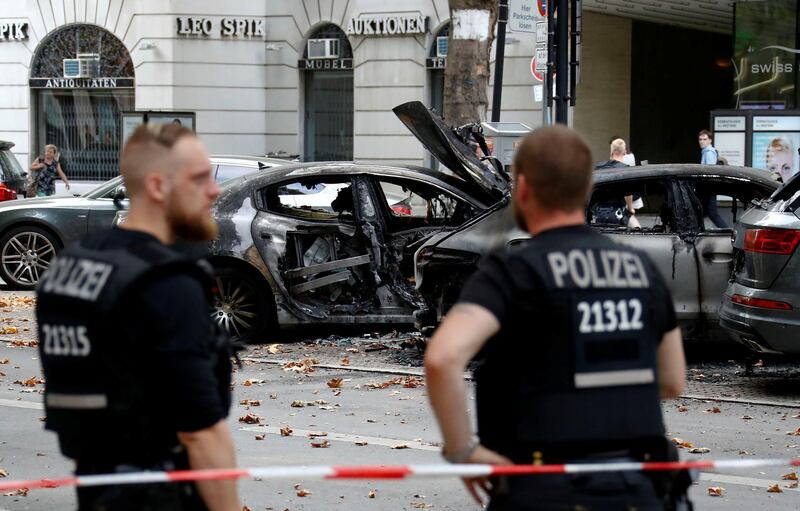Germany’s anti-money laundering unit has been accused of serial failure to safeguard against suspect transactions, including missed alerts and long delays in triggering police inquiries into money transfers thought to be linked to alleged terrorist activities.
The Financial Intelligence Unit was described as endangering German lives due to its vast backlog of reports that sometimes took as long as six months to be shared. Whistle-blowers included Sebastian Fiedler, a senior German detective, who described it as the “biggest security disaster in post-war history".
The FIU was established in 2016 and tasked with identifying and forwarding any suspicions of money laundering associated with terrorists or criminals to security services.
It’s 165 full-time workers reportedly have a backlog of 20,000 reports to review and more than 70,000 new ones are expected this year.
"It must be ensured, within a few working days, that a criminal investigation agency can make a decision on whether a transaction can be carried out or whether the funds are to be confiscated. If information about it reaches a public prosecutor's office weeks later, then the funds are gone," Mr Fiedler told German broadcaster Bayerischer Rundfunk.
A senior prosecutor in North Rhine-Westphalia added: “I wouldn’t want to be in (FIU’s) shoes if there is an attack and it turns out there was an explicit tip in their files.”
Among the suspect transactions laid out in a secret report to the German parliamentary finance committee, seen by Handelsblatt, was information on a suspicious payment of €18,000 (Dh76,609) into an Islamic banking operation in January this year was not forwarded to police for investigation until two months later.
The Islamic KT Bank in Frankfurt is a subsidiary of the Turkish banking institution Kuveyt-Turk Participation Bank, which is itself owned by the Kuwaiti Finance House (KFH). Both have been accused of being used to funnel money to ISIS, al-Qaeda and Hamas.
US officials have alleged KFH had been used by Qatar and Kuwaiti-based extremists to help fund the former al-Qaeda Syrian offshoot Al-Nusra Front. In August 2015, the US Treasury argued Saad bin Saad al-Kabi and Abd al-Latif al-Kawari funded extremists with funds transferred to KFH from Qatari bank accounts.
David Cohen, the former Under-Secretary for terrorism and financial intelligence, raise the alarm in 2016 over the activities of terrorist financier, Hajjaj al-Ajmi, who was using KFH and Kuveyt-Turk to help fund al-Nusra with the help of his high-profile social media pages. In 2014, the US treasury designated Mr al-Ajmi as a supporter of terrorism along with two other Kuwaiti-based supporters of al-Nusra and ISIS.
It was part of a long pattern of similar behaviour and the US Congress record shows that the former US national counterterrorism coordinator at the National Security Council, Richard Clarke, told Congress of evidence against the group as far back as 2003. “Kuwait Finance House is reported to be the financial arm of the Muslim Brotherhood in Kuwait,” he said in testimony before a House of Representatives committee.
The destination of the €18,000, which was made up quickly from series of smaller lodgements, remains unknown as it was sent to financial institutions in neighbouring Netherlands before the German police started enquiries in March. While small, a senior public prosecutor said not much was needed to carry out deadly attacks. One expert in the field said terror groups carried attacks with quickly put together budgets. “The smallest sums can produce the biggest dangers,” said Andreas Stueve, who focuses on money laundering from the city of Dusseldorf.
Mr Fiedler, the senior detective, estimated some €100 billion (Dh 425.6 billion) is laundered through Germany every year. The failing of the authorities to keep track of transactions and ultimately step in to seize resources destined from criminals and terrorists is too big to ignore. "We can only get a fraction of them in our hands," he said.
Questions of the FIU’s competency are likely to hit the government hard. When It became operational just over a year ago, then finance minister Wolfgang Schäuble said FIU was the lynchpin of German effort to increase its efforts against money laundering and the financing of terrorism. The restructuring and its expanding operations was designed to make the country’s customs service a more effective front line force.
However, some detectives were upset over the decision at the time, particularly because money laundering units were being moved from the authority of the police to customs. None of the employees at the FIU's predecessor were transferred and only two of the new staff had law enforcement background, the business paper Handelsblatt reported.
It “will cause massive deterioration in the fight against money laundering and terrorist financing,” Mr Fiedler warned the Bundestag last year. It would "a risk to the internal security of the Federal Republic of Germany” and the government had failed to “at best, vaguely assert” the benefits of the move.
_______________
Read more:
[ Qatar funded pro-Israel US groups in lobbying campaign ]
[ UK commission to probe output of ‘intellectual’ extremists ]
_______________
The FIU has sought to largely deflect the attention, blaming staff shortages and ICT problems – though a spokesman did admit to a few teething problems. The FIU’s staff will treble from 165 to 475 by 2019 and a new boss, the lawyer Christof Schulte, who previously worked for the customs authority and finance ministry, took charge on August 1.
The FIU is also being given more powers, meaning it can access data it needs from law enforcement, financial and administrative authorities. It will also have the right to immediately stop all suspicious transactions.
The Paris-based Financial Action Task Force on Money Laundering had praised Germany advances in 2014 after finding shorting comings in a 2010 report. FATF said in its 2014 findings that “enhanced cooperation between relevant ministries, regulatory and supervisory authorities as well as other bodies involved in combating money laundering and terrorist financing,” were sufficient to remove Germany from countries on a scrutiny watchlist.







